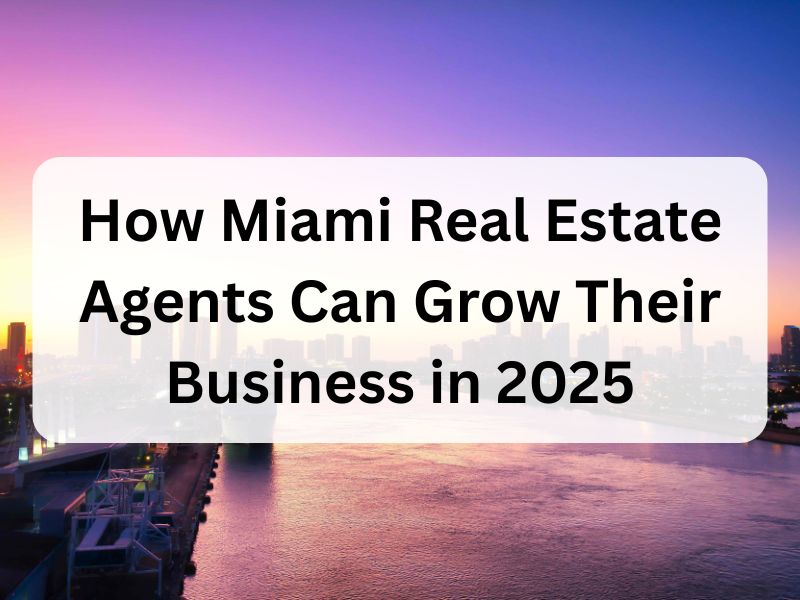Miami isn’t just one of the hottest cities in the U.S. — it’s one of the most competitive real estate markets in the world. With a steady flow of international buyers, high-net-worth investors, retirees, and remote professionals flocking to South Florida, opportunities for realtors are huge. But in 2025, the Miami market comes with challenges too: rising interest rates, inventory shortages, and intense competition from both traditional agents and big tech platforms.
So, how can Miami real estate agents stand out and grow their business this year?
Here are seven proven strategies tailored specifically for the Miami market in 2025.
1. Embrace Miami’s Global Buyer Pool
Miami has long been a hub for international buyers — particularly from Latin America, Canada, and Europe. In 2025, this trend continues, with many foreign investors seeking second homes, rental properties, and tax-friendly investments.
Growth Tips:
- Create multilingual marketing materials (Spanish and Portuguese are must-haves).
- Partner with international brokers to reach overseas buyers.
- Offer virtual showings and remote closing assistance to accommodate foreign clients.
Why it works: Agents who can connect seamlessly with global buyers expand their market reach beyond Florida and open the door to high-value, cash-heavy deals.
2. Position Yourself as a Lifestyle Expert, Not Just an Agent
In Miami, real estate is more than square footage — it’s lifestyle. Buyers aren’t just purchasing a home; they’re buying into the culture, weather, and amenities.
Growth Tips:
- Create content around Miami lifestyles: waterfront living, golf communities, nightlife, or family-friendly suburbs.
- Use Instagram Reels, TikTok, and YouTube Shorts to showcase neighborhoods like Brickell, Coral Gables, and Coconut Grove with a lifestyle focus.
- Collaborate with local businesses (restaurants, fitness studios, yacht clubs) to highlight what life in Miami really looks like.
Why it works: People moving to Miami want an insider’s view. Agents who demonstrate lifestyle expertise build stronger emotional connections with buyers.
3. Double Down on Video Marketing
Miami is one of the most visually appealing cities in the U.S., which makes it the perfect place for video-first marketing. In 2025, short-form video is the most powerful way to attract attention and generate leads.
Growth Tips:
- Record short 30–60 second listing videos with drone footage of waterfront properties or skyline views.
- Post “Market Minute” updates weekly with local stats, trends, and tips.
- Use behind-the-scenes content: staging prep, open house setup, or a “day in the life” of a Miami realtor.
Why it works: Video builds trust, shows off your expertise, and allows you to stand out in a crowded market. Plus, Miami’s scenery practically markets itself.
4. Leverage AI & Automation for Lead Follow-Up
Leads in Miami are expensive, and competition is fierce. If you’re not following up instantly, another agent will. AI and automation tools are game-changers for 2025.
Growth Tips:
- Use AI callers and chatbots to respond to leads within seconds.
- Automate drip campaigns via email and text to nurture leads until they’re ready to act.
- Segment your CRM to prioritize hot leads (cash buyers, relocation clients) versus cold ones.
Why it works: In a fast-moving market, speed-to-lead makes or breaks deals. AI ensures you never miss a chance to connect.
5. Tap Into Miami’s Luxury Market
Miami’s luxury sector remains strong in 2025, with demand for waterfront estates, high-rise condos, and branded residences (think Armani Casa or Porsche Design Tower). These high-net-worth buyers expect premium service and polished marketing.
Growth Tips:
- Invest in professional photography, videography, and 3D tours for luxury listings.
- Offer concierge-style services (relocation assistance, private showings, lifestyle perks).
- Network in high-end communities, yacht clubs, and business associations to connect with affluent buyers.
Why it works: Luxury buyers aren’t browsing Zillow casually — they’re looking for agents who understand exclusivity and can provide white-glove service.
6. Build Hyper-Local Expertise in Niche Neighborhoods
From South Beach to Wynwood to Key Biscayne, Miami is a city of micro-markets. Buyers and sellers want agents who specialize in their exact neighborhood.
Growth Tips:
- Pick 2–3 key neighborhoods to dominate and create regular content for them.
- Run targeted Facebook and Instagram ads for specific zip codes.
- Publish blog posts and guides like “Living in Brickell: 2025 Market Insights” or “Why Coconut Grove Is Miami’s Hottest Family Market.”
Why it works: Big portals like Zillow can’t compete with your local knowledge. Hyper-local positioning makes you the obvious choice in your farm area.
7. Educate Buyers & Sellers in a Confusing Market
Interest rates, inventory shifts, and affordability challenges have left many Miami buyers and sellers unsure of their next move. Agents who step in as educators will gain trust and long-term clients.
Growth Tips:
- Host monthly webinars like “Buying in Miami with High Interest Rates” or “Is Now the Right Time to Sell in Miami?”
- Share simple infographics on Instagram that break down market trends.
- Offer free guides such as “The Miami Relocation Handbook 2025.”
Why it works: When you provide clarity, people see you as an advisor, not just a salesperson — and advisors get referrals.
Final Thoughts
Miami real estate in 2025 is fast-paced, competitive, and full of opportunity. To grow your business this year, you need to combine local expertise, modern marketing, and tech-driven efficiency. By embracing Miami’s global buyer pool, creating lifestyle-driven content, using video, leveraging AI, focusing on luxury, building hyper-local authority, and educating your clients, you’ll not only survive but thrive in one of the hottest markets in the world.
✅ Next Step: Pick one of these strategies and take action this week. Record a neighborhood video tour, set up an AI follow-up tool, or publish a lifestyle blog about Miami living. Every small step builds momentum — and in Miami, momentum turns into closings.

